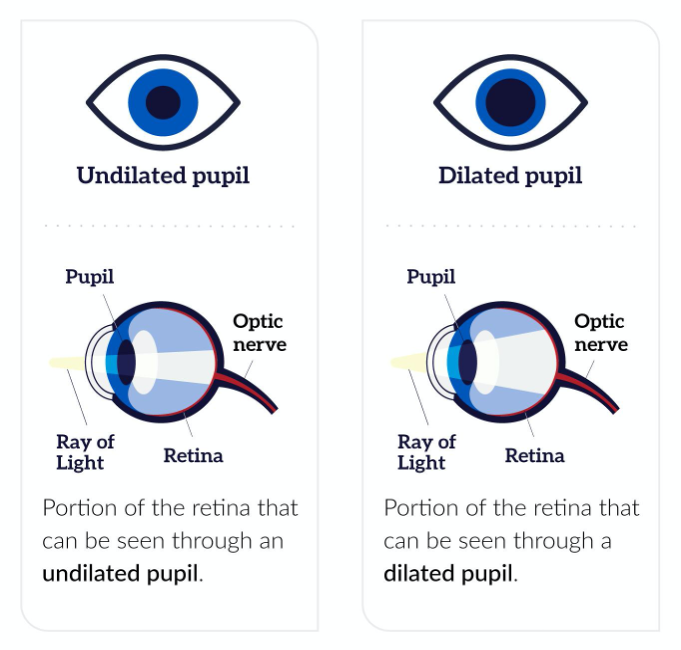January 2020 Newsletter
Bring in 2020 with 20/20 Vision
Make Eye Health A New Year’s Resolution – Get A Dilated Eye Exam
Every New Year, you make a list of things you will do to stay healthy so you can feel your best. But, did you realize that feeling your best includes seeing your best too? Get a Dilated Eye Exam.
What Is A Dilated Eye Exam?
A dilated eye exam is the best thing you can do for your eye health! It’s the only way to check for eye diseases early on, when they’re easier to treat — and before they cause vision loss.
The exam is simple and painless. We will check for vision problems that make it hard to see clearly, like being nearsighted or farsighted. We will give you some eye drops to dilate (widen) your pupil and check for eye diseases.
Since many eye diseases have no symptoms or warning signs, you could have a problem and not know it. Even if you think your eyes are healthy, getting a dilated eye exam is the only way to know for sure.
How Often Do I Need To Get A Dilated Eye Exam?
How often you need a dilated eye exam depends on your risk for eye disease.
Get a dilated eye exam every 1 to 2 years if you:
Are over age 60
Are African American and over age 40
Have a family history of glaucoma
Most people with diabetes or high blood pressure need to get a dilated eye exam at least once a year.
What Happens During A Dilated Eye Exam?
The exam includes:
A visual acuity test to check how clearly you see. Your doctor will ask you to read letters that are up close and far away.
A visual field test to check your peripheral (side) vision. Your doctor will test how well you can see objects off to the sides of your vision without moving your eyes.
An eye muscle function test to check for problems with the muscles around your eyeballs. Your doctor will move an object around and ask you to follow it with your eyes.
A pupil response test to check how light enters your eyes. Your doctor will shine a small flashlight into your eyes and check how your pupils react to the light.
A tonometry test to measure the pressure in your eyes. Your doctor will gently touch your eye with a special tool. Don’t worry — it doesn’t hurt!
Dilation to check for problems with the inner parts of your eye. Your doctor will give you some eye drops to dilate (widen) your pupil. This helps the doctor see inside your eye.
Depending on your needs, your doctor may include other tests too. Ask your doctor if you have questions.
How does dilation work?
Dilating your pupil lets more light into your eye — just like opening a door lets light into a dark room. Dilation helps your eye doctor check for many common eye problems, including diabetic retinopathy, glaucoma, and age-related macular degeneration (AMD).
What Happens After A Dilated Eye Exam?
For a few hours after a dilated eye exam, your vision may be blurry and you may be sensitive to light. Ask a friend or family member to drive you home from your appointment if you feel more comfortable.
If your eye doctor finds refractive errors in your vision, you may get a prescription for eyeglasses or contact lenses to help you see more clearly.
If your eye doctor finds signs of an eye disease, you can talk about treatment options and decide what’s right for you. Learn more about these common eye diseases:
Cataract
https://www.eyecentersofnwo.com/newsletters/june-2019-newsletter
Diabetes
https://www.eyecentersofnwo.com/newsletters/november-2019
Glaucoma
https://www.eyecentersofnwo.com/newsletters/january-2019-newsletter
Macular Degeneration https://www.eyecentersofnwo.com/newsletters/february-2019-newsletter
Why You Should Get A Regular Dilated Eye Exam
In This Issue
Make Eye Health A New Year’s Resolution
What Is A Dilated Eye Exam?
How Often Do I Need To Get A Dilated Eye Exam?
What Happens During A Dilated Eye Exam?
What Happens After A Dilated Eye Exam?
Contact Us
2311 W. Hayes Ave,
Fremont
Ohio 43420
(419) 334 8121
622 Parkway Drive,
Fostoria
Ohio 44830
(419) 435 3482
Courtesy: Prevent Blindness
Courtesy: National Eye Institute, National Institutes of Health (NEI/NIH)
No Vision Insurance, No Problem. Join our Membership Program today!
Courtesy: The American Academy of Ophthalmology
For previous newsletters:




